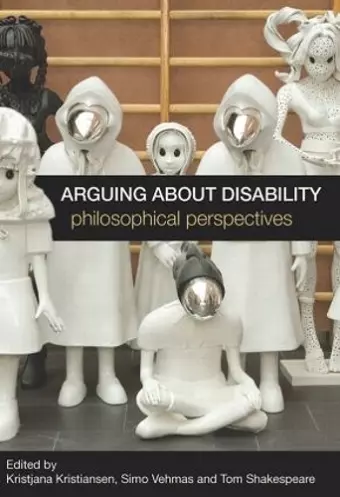Arguing about Disability
Philosophical Perspectives
Tom Shakespeare editor Simo Vehmas editor Kristjana Kristiansen editor
Format:Paperback
Publisher:Taylor & Francis Ltd
Published:13th Jul '10
Currently unavailable, and unfortunately no date known when it will be back
This paperback is available in another edition too:
- Hardback£155.00was £155.00(9780415455954)

Disability is a thorny and muddled concept - especially in the field of disability studies - and social accounts contest with more traditional biologically based approaches in highly politicized debates. Sustained theoretical scrutiny has sometimes been lost amongst the controversy and philosophical issues have often been overlooked in favour of the sociological. Arguing about Disability fills that gap by offering analysis and debate concerning the moral nature of institutions, policy and practice, and their significance for disabled people and society.
This pioneering collection is divided into three sections covering definitions and theories of disability; disabled people in society and applied ethics. Each contributor – drawn from a wide range of academic backgrounds including disability studies, sociology, psychology, education, philosophy, law and health science – uses a philosophical framework to explore a central issue in disability studies. The issues discussed include personhood, disability as a phenomenon, social justice, discrimination and inclusion.
Providing an overview of the intersection of disability studies and philosophical ethics, Arguing about Disability is a truly interdisciplinary undertaking. It will be invaluable for all academics and students with an interest in disability studies or applied ethics, as well as disability activists.
'Arguing About Disability is one of the first books to attempt to bring together philosophy and disability and in so doing examine the complexity of disability. This important and comprehensive collection explores disability from a range of theoretical perspectives including the ontology of disability - how liberty, justice, equality and disability are linked, as well as ethics and disability - and gives new insights into current debates on disability. This collection is a welcome contribution to the maturing of disability studies and clearly shows the invaluable contribution that philosophy can make to debates on disability and disability research...'--Nick Watson, University of Glasgow, UK
'One of the best qualities of this collection is its accessibility to both philosophers and disability studies scholars who may have little or no experience with the other field. The book's introduction by its editors makes a strong case for the productivity of the endeavor before giving a clear and concise overview of disability studies history, progressing through moral, medical, and social models, and providing a brief breakdown of those parts of philosophy that are relevant to the work...Arguing About Disability would be a beneficial introduction to the intersection of philosophy and disability studies.'--Disability Studies Quarterly
'A rich collection of new insights from scholars in philosophy, bioethics, social science, law, disability studies and special education.'--Journal of Medical Ethics
‘The papers in Arguing about Disability bring the analytical rigour of philosophy and the careful attention to empirical realities of disability studies together in insightful and helpful ways...Many of the papers in this collection are by leading experts in disability studies, social policy, and health law. The quality and interest of the papers confirms the renown of many of these thinkers. This work incorporates a rich range of theoretical backgrounds, while preserving its coherence as an anthology....It brings philosophical issues to bear in fruitful and readable ways, adding a depth to reflection on disability issues that other books and anthologies either lack, or presume the reader already possesses.’ -- Critical Social Policy
'Anyone with any philosophical background who is interested in the field of disability studies, whether or not they count themselves as philosophers, ought to read [this book], and to engage with its arguments.'--Peter Herissone-Kelly, Metapsychology Online Reviews (2009)
ISBN: 9780415588539
Dimensions: unknown
Weight: 430g
224 pages